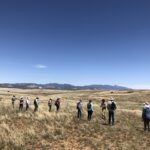UPDATE 9/19/2014: HR 4, Jobs for America Act has replaced S 1600 and included harmful provisions from HR 761. The bill has already passed the House. In the unlikely event that it passes the Senate, White House Administration is planning to recommend a veto.
1/28/2014: S 1600: Critical Minerals Policy Act of 2013, has replaced HR 761 in the Senate. Read Bill. S 1600 does not include the harmful provisions that were passed through the House of Representatives with HR 761. HR 761 streamlined the permitting process for mines that produced strategic and critical minerals, and had such a broad definition of those minerals that almost everything could be strategic and bypass the normal NEPA process. Also, it would have set permitting timelines and litigation limits for hardrock mining on federal land. S 1600 does not have those provisions, and is generally much more benign.
9/18/2013: Members passed H.R. 761, the National Strategic and Critical Minerals Production Act, in a 246-178 vote. ”House passage sends the bill to the Senate, but like in the last Congress, it seems unlikely that the Senate will consider the bill.” The Hill
HR 761, the Strategic and Critical Minerals Production Act of 2013, would require less public review and environmental protection for all hardrock mines proposed anywhere in this country. This bill takes an already privileged industry and gives them even more, while harming rural communities and putting clean water at risk.
We oppose H.R. 4. Take Action and tell your Senator to oppose H.R. 4 below.
We oppose H.R. 761: National Strategic and Critical Minerals Production Act: To require the Secretary of the Interior and the Secretary of Agriculture to more efficiently develop domestic sources of the minerals and mineral materials of strategic and critical importance to United States economic and national security and manufacturing competitiveness. Read HR 761
This is a bill aimed at streamlining U.S. mining project permitting and limiting citizen lawsuits against mining projects.
- H.R. 761 basically declares all domestic mineral extraction vital to the nation’s security, infrastructure and economic security. The reality is that most mineral extraction occurring in the U.S. is being done by foreign mining companies selling our domestic minerals overseas and paying nothing in federal royalties to do so. [Boom, Bust, Boom Bill Carter]
- Instead of improving the 1872 Mining Law, this bill sets out to force a broken system to work faster. The bill would fast-track the total review process for issuing mining permits. The real solution is to update the 1872 Mining Law into a comprehensive plan for modern day mining.
- This bill allows federal agencies to exempt mining projects from review under the National Environmental Policy Act of 1969 (NEPA). NEPA makes sure that in addition to government and industry input, everyday citizens can take part in the development and oversight of projects that affect our social, economic, and environmental health.
- H.R. 761 would also set time limits for litigation and limit any preliminary injunctions to halt mining projects. For agencies that fail to follow their own laws, litigation is often the only tool for enforcement. Limiting preliminary injunctions can allow irreparable damage to occur before the case is even heard.
We need all available tools to protect public interest. This bill would tie our hands to make sure that the best interest of all involved are served.
Read: Mining firm profits from public lands remain a mystery, new GAO study shows The federal government has no idea how much gold, copper and other hard-rock minerals are being extracted from public lands each year — nor how much the minerals are worth — because the companies licensed to operate the mines pay no royalties, according to a report the Government Accountability Office will make public. The Washington Post 12/11/2012
National Strategic and Critical Minerals Protection Act reintroduced to US Congress U.S. Congressman Mark Amodei, R-Nevada, and 28 cosponsors have reintroduced the National Strategic and Critical Minerals Protection Act of 2013, virtually the same bill which was passed by the House in the 112th Congress, but stalled in the U.S. Senate. MineWeb 2/18/2013









